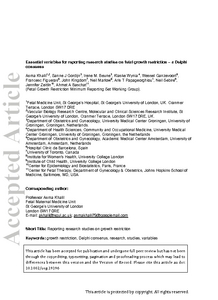Khalil, A;
Gordijn, SJ;
Beune, IM;
Wynia, K;
Ganzevoort, W;
Figueras, F;
Kingdom, J;
Marlow, N;
Papageorghiou, AT;
Sebire, N;
et al.
Khalil, A; Gordijn, SJ; Beune, IM; Wynia, K; Ganzevoort, W; Figueras, F; Kingdom, J; Marlow, N; Papageorghiou, AT; Sebire, N; Zeitlin, J; Baschat, AA; Fetal Growth Restriction Minimum Reporting Set Working Group.
(2019)
Essential variables for reporting research studies on fetal growth restriction: a Delphi consensus.
Ultrasound Obstet Gynecol, 53 (5).
pp. 609-614.
ISSN 1469-0705
https://doi.org/10.1002/uog.19196
SGUL Authors: Khalil, Asma
![[img]](https://openaccess.sgul.ac.uk/110099/1.hassmallThumbnailVersion/Khalil_et_al-2018-Ultrasound_in_Obstetrics_%2526_Gynecology.pdf)  Preview |
|
PDF
Accepted Version
Available under License ["licenses_description_publisher" not defined].
Download (420kB)
| Preview
|
Abstract
Objective
To determine, by expert consensus using a Delphi procedure, a minimum reporting set of study variables for fetal growth restriction (FGR) research studies.
Methods
A panel of experts, identified based on their publication record as lead or senior author of studies on FGR, was asked to select a set of essential reporting study parameters from a literature‐based list of variables, utilizing the Delphi consensus methodology. Responses were collected in four consecutive rounds by online questionnaires presented to the panelists through a unique token‐secured link for each round. The experts were asked to rate the importance of each parameter on a five‐point Likert scale. Variables were selected in the three first rounds based on a 70% threshold for agreement on the Likert‐scale scoring. In the final round, retained parameters were categorized as essential (to be reported in all FGR studies) or recommended (important but not mandatory).
Results
Of the 100 invited experts, 87 agreed to participate and of these 62 (71%) completed all four rounds. Agreement was reached for 16 essential and 30 recommended parameters including maternal characteristics, prenatal investigations, prenatal management and pregnancy/neonatal outcomes. Essential parameters included hypertensive complication in the current pregnancy, smoking, parity, maternal age, fetal abdominal circumference, estimated fetal weight, umbilical artery Doppler (pulsatility index and end‐diastolic flow), fetal middle cerebral artery Doppler, indications for intervention, pregnancy outcome (live birth, stillbirth or neonatal death), gestational age at delivery, birth weight, birth‐weight centile, mode of delivery and 5‐min Apgar score.
Conclusions
We present a list of essential and recommended parameters that characterize FGR independent of study hypotheses. Uniform reporting of these variables in prospective clinical research is expected to improve data quality, study consistency and ultimately our understanding of FGR.
| Item Type: |
Article
|
| Additional Information: |
This is the peer reviewed version of the following article: Khalil, A. , Gordijn, S. J., Beune, I. M., Wynia, K. , Ganzevoort, W. , Figueras, F. , Kingdom, J. , Marlow, N. , Papageorghiou, A. T., Sebire, N. , Zeitlin, J. and Baschat, A. A. (2019), Essential variables for reporting research studies on fetal growth restriction: a Delphi consensus. Ultrasound Obstet Gynecol, 53: 609-614, which has been published in final form at https://doi.org/10.1002/uog.19196. This article may be used for non-commercial purposes in accordance with Wiley Terms and Conditions for Use of Self-Archived Versions. |
| Keywords: |
Delphi consenus, growth restriction, research, studies, variables, Obstetrics & Reproductive Medicine, 1114 Paediatrics And Reproductive Medicine |
| SGUL Research Institute / Research Centre: |
Academic Structure > Molecular and Clinical Sciences Research Institute (MCS) |
| Journal or Publication Title: |
Ultrasound Obstet Gynecol |
| ISSN: |
1469-0705 |
| Language: |
eng |
| Publisher License: |
Publisher's own licence |
| PubMed ID: |
30125411 |
| Dates: |
| Date |
Event |
| 2019-05-03 |
Published |
| 2018-08-19 |
Published Online |
| 2018-07-20 |
Accepted |
|
 |
Go to PubMed abstract |
| URI: |
https://openaccess.sgul.ac.uk/id/eprint/110099 |
| Publisher's version: |
https://doi.org/10.1002/uog.19196 |
Statistics
Item downloaded times since 31 Aug 2018.
Actions (login required)
 |
Edit Item |



